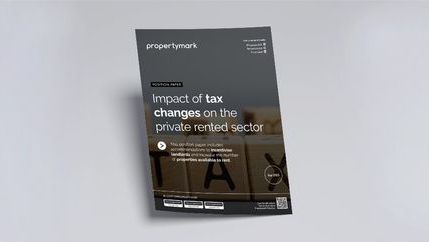
Propertymark has analysed the impact of these changes using survey data from members and other private and public sector organisations, to highlight the detrimental impact that government decisions since 2015 have had on the tax and financial situation for landlords, contributing to the current lack of available rental properties.
Landlords are not immune to the cost-of-living crisis and rising expenses and ongoing legislative changes, with more proposals on the horizon, all act to disincentivise investment in housing. Therefore, our position paper, Impact of Tax Changes on the Private Rented Sector, outlines recommendations to incentivise and increase the number of properties to rent.
The increasing tax burden has squashed growth
Over recent years, landlords offering homes to long-term tenants have seen higher rates of tax on the initial property purchase.
- Under stamp duty land tax rules in England and Northern Ireland a buy-to-let landlord purchasing an additional property for £290,000 (average UK house price) can expect to pay £10,700 in stamp duty, when a main resident would only pay £2,000.
- In Scotland, land and buildings transaction tax on an additional property valued at £185,000 (average house price in Scotland) would be £11,900 for a by-to-let investor with a main resident only paying £800.
- The situation in Wales is even more stark, as a buy-to-let landlord would pay nearly £10,000 in land transaction tax for an additional property, based on an average Welsh house price of £215,000, when a main resident would pay nothing.
A significant change since 2016 has been the Capital Gains Tax (CGT) for individuals owning property. In March 2016, CGT rates were cut significantly for top-rate taxpayers from 28% to 20%, and from 18% to 10% for lower earners. However, landlords were excluded from the cuts meaning that while the sale of shares in a company that owns the property would incur CGT at 20%, individuals making reasonable gains on the sale of a second property would face the existing 28%.
Other burdens include a reduction in the available tax relief on mortgage interest costs and the removal of the 10% wear and tear allowance for fully furnished properties making these cumulative changes result in a system with limited opportunities for small investors because the ability to offset finance costs against tax liabilities has been eroded. Furthermore, there is little incentive to upgrade existing rental properties because repairs and maintenance are tax deductible, but improvements are not.
Propertymark's recommendations
Governments across the UK must recognise the impact of the current tax regime on the availability of homes in the PRS, and ultimately the costs passed on to tenants. We implore them to look at these six key areas and offer incentives for landlords to continue investing in the sector.
Review taxes that apply to private landlords
Develop policies that promote long-term investment and reduce costs for tenants.
Reinstate mortgage tax relief
Level the playing field between landlords operating in their own name (who are subject to the tax changes) and those who are set up as a business (who are not).
Reduce taxes on additional properties
Existing surcharges must be reduced and could be split so a lower percentage is paid by landlords looking to invest in the PRS and a higher percentage is paid by individuals buying second homes.
Bring back tax relief for energy efficiency
Help landlords with the cost of energy efficiency work and ensure that tenants benefit from lower bills.
Reduce Capital Gains Tax thresholds
Align residential property with other asset classes and remove the disincentive to invest.
Avoid rent control
Evidence has shown that flexible tenancies and rent prices driven by market forces have led to the success of the private rented sector across the UK, therefore, rent controls should be avoided.
Impact of tax changes on the private rented sector
Using survey data from Propertymark members, and other private and public sector organisations, this position paper highlights the detrimental impact that government decisions since 2015 have had on the tax and financial situation for landlords in the PRS.





